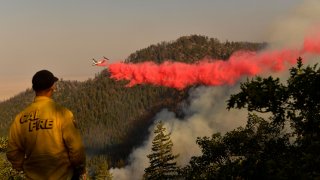
- Wildfires made worse by climate change produced a record amount of carbon emissions in parts of Siberia, the U.S. and Turkey this year, the Copernicus Atmosphere Monitoring Service said Monday.
- Blazes also devastated Albania, Algeria, Greece, Italy, North Macedonia, Spain and Tunisia
- Climate change has fueled hotter temperatures and drier conditions across the world, which have contributed to longer and more intense wildfire seasons.
Wildfires worsened by climate change produced a record amount of carbon emissions in parts of Siberia, the U.S. and Turkey this year, scientists with the Copernicus Atmosphere Monitoring Service said on Monday.
Intense and prolonged blazes emitted an estimated total of 1.76 billion tons of carbon — the equivalent of more than a quarter of U.S. annual carbon emissions.
The Sakha Republic in northeastern Siberia, Turkey, and the western U.S. recorded their highest wildfire emissions in 2021, according to Copernicus. Wildfires also devastated Albania, Algeria, Greece, Italy, North Macedonia, Spain and Tunisia.
"As the year draws to a close, we have seen extensive regions experience intense and prolonged wildfire activity, some of which has been at an level not observed in the last couple of decades," said senior Copernicus scientist Mark Parrington.
Human-caused climate change has fueled hotter temperatures and drier conditions across the world, which have contributed to longer and more intense wildfire seasons. 2020 was one of the hottest years on record, and 2021 is virtually certain to be among the 10 hottest years ever recorded.
Money Report
In July, the Dixie fire started in Northern California and burned for more than three months. It became the second-largest wildfire in the state's history. Fires in California, Canada and the U.S. Pacific Northwest this year emitted about 83 million tons of carbon, and plumes of smoke from those blazes traveled across the Atlantic Ocean and reached large swaths of Europe.
Many countries around the eastern and central Mediterranean also suffered several days of intense wildfires over the summer that led to high concentrations of fine particulate matter and degraded air quality. In July, fires in Turkey prompted widespread evacuations and killed thousands of animals.
Get a weekly recap of the latest San Francisco Bay Area housing news. Sign up for NBC Bay Area’s Housing Deconstructed newsletter.
"Drier and hotter regional conditions caused by global warming increase the risk of flammability and fire risk of vegetation and this has been reflected in the extremely large, fast-developing and persistent fires we have been monitoring," Parrington said. "It is clear from 2021 that climate change is providing the ideal environments for wildfires."






